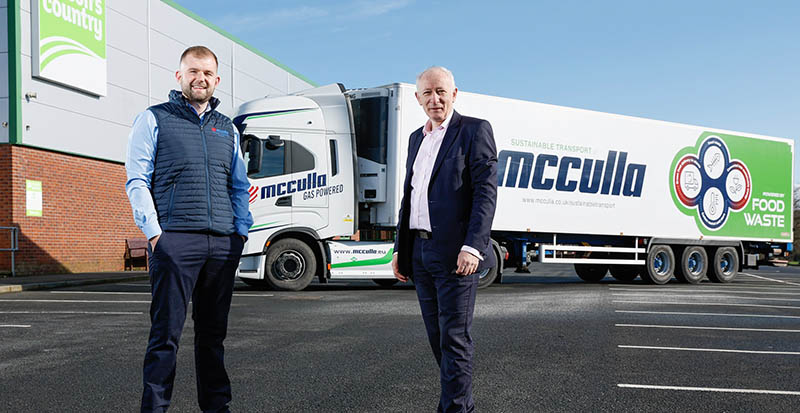
Leading, Irish potato packer and processor, Wilson’s Country, has been reducing its greenhouse gas (GHG) emission levels by the 4.5 tonnes of carbon dioxide (CO2) equivalent per week, since the beginning of 2024.
This is the direct result of working in collaboration with Lisburn based haulage business, McCulla Ireland, which operates a fleet fuelled by “green biogas” for their downstream transportation & logistics.
Wilson’s Country managing director, Lewis Cunningham explained: “We are delighted with the agreement reached with McCulla Ireland. It means that our outbound goods, destined for customers throughout the island of Ireland will be transported in lorries that are fuelled with biogas produced courtesy of McCulla’s own anaerobic digestion plant in Lisburn.”
He added “This has helped us to reduce our scope 3 GHG emissions by an amount equal to 4.5 tonnes of carbon emitted a week. The environmental impact of this is comparable to planting 625 trees per week, which over one year would be equal to 30,000 trees.”
“The development represents a win:win scenario for Wilson’s Country and the customers we supply.”
All nations, including the UK, that signed the Paris Agreement in 2015 (COP15) have agreed to deliver a net zero carbon position by 2050. This means that both the public and private sectors need to deliver on massive reductions in carbon emissions and make improvements. The GHG protocol is a standard used to help businesses measure, understand and reduce their emissions. It outlines 7 gases, and their CO2 equivalent and encourages the reporting of emissions through scopes.
Scope 1 & Scope 2 emissions relate to activities that take place within a business. Scope 3 emissions on the other hand, are related to all the products and services required by the business that are completed by, or come from, outside of the business itself. Scope 3 are supply chain emissions, in both directions (upstream & downstream.)
Craigavon based Wilson’s Country is committed to securing a carbon net zero position within the most feasible time frame possible. “We have recently invested in our own anaerobic digestion plant” confirmed Lewis Cunningham. “Fuelled for the most part by potato waste from the business it is already producing 60% of the electricity that we need on an annual basis.”
“This commitment alongside other initiatives on site has helped us to secure a 78% reduction in Scope 1 & 2 emissions from our baseline year, compared to our most recent reporting year. “
“By working with McCulla we are able to proactively plan and reduce our Scope 3 emissions, for downstream transport and logistics. This is a carbon intensive area of the business and we are delighted to be able to make such a significant reduction.”
Alan Thompson, commercial manager at McCulla Ireland, commented, “We are delighted to be working with Wilson’s Country. Both companies are transitioning to a carbon net zero position in a very meaningful way”
“McCulla Ireland is leading the way in Sustainability with their innovative approach to logistics solutions”
“Our bio-methane fleet are helping customers achieve a 93% reduction in carbon emissions, making significant progress in reducing scope 3 emissions across Ireland”
“We are excited to extend this solution to a number of customers and are even prouder to have partnered up with Wilson’s Country”
“They are a like-minded, family-run business, striving for the best when it comes to both sustainability and providing a fantastic service to customers”
Additionally McCulla is thrilled to announce its partnership with Farming Carbon, and SusNeo to accurately report its Carbon Climate and Environmental, Social & Governance (ESG) performance levels.
Alan Thompson again: “This collaboration is helping us achieve our commitment of 50% carbon reduction by 2030, in line with SBTi, making us one of the only Logistics and Warehousing companies in Ireland to do so”
“At McCulla, we are committed to a circular economy, taking food waste out of our customers supply chain and processing it to create bio-methane to power our fleet of trucks”
He continued: “The byproduct, digestate, is then used within our customers supply chains as a fertilizer to grow crops again”
“This investment has given us a real USP on the island of Ireland and the best part is, we can compete commercially with any diesel haulier.
Alan Thompson concluded: “McCulla Ireland is committed to driving sustainability forward and we are proud to be making a positive impact on our environment.”